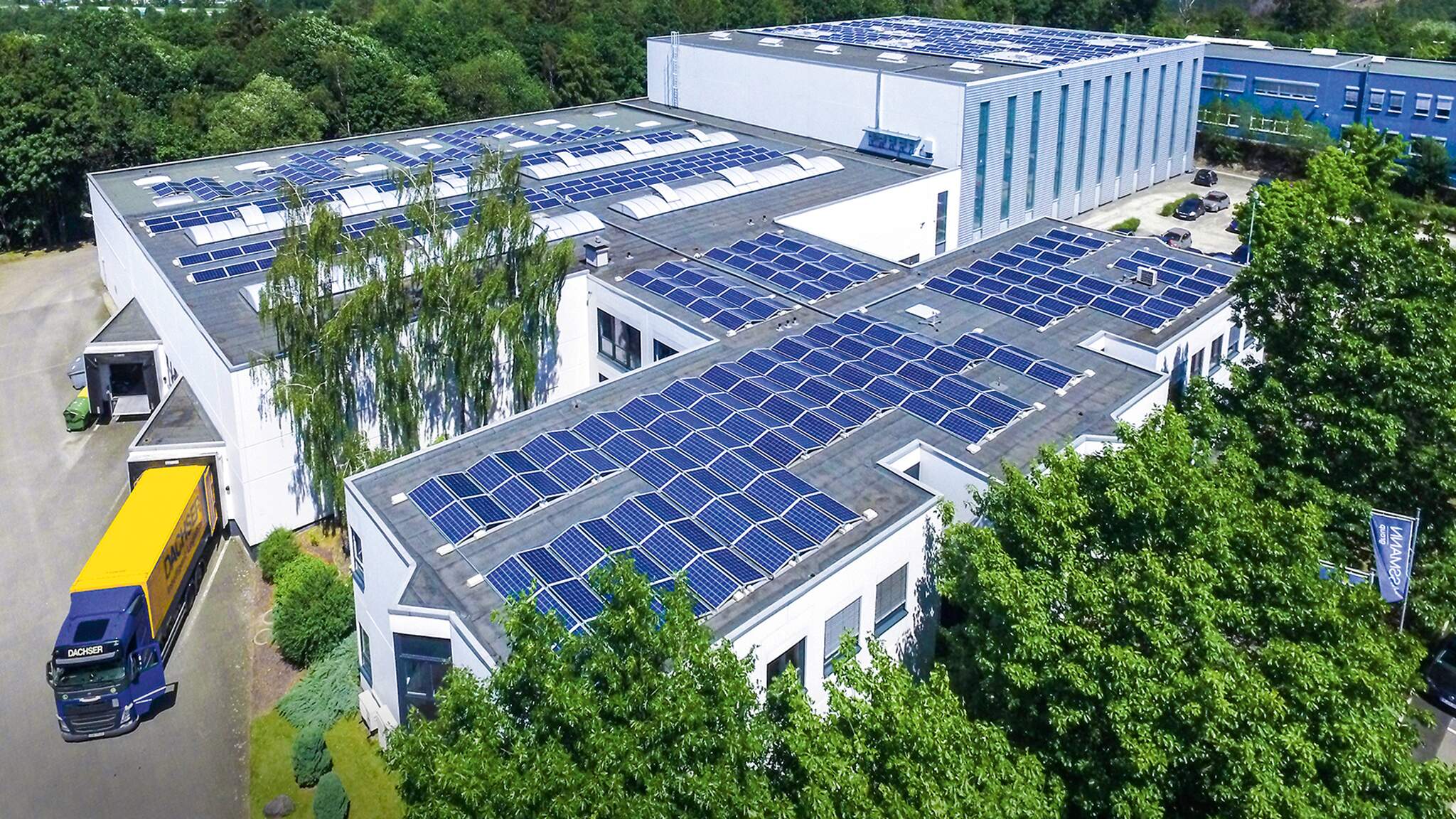Rapid cables
With its specialization in data network technology and IT infrastructure, the Assmann Group has been benefiting from current demand for fast digital connections. But Dachser’s relationship with the company from Lüdenscheid in western Germany goes way back. For the past 23 years, DACHSER has supported Assmann on its road to success in Germany and Europe.

The truck reaches the Ruhr University Bochum campus at 2 p.m., precisely within the fixed time slot. As one vehicle arrives on the spacious grounds, another departs. The timing has to be precise, as construction is going on at many sites. One of these is the renovation of a building complex. “We’re upgrading the IT infrastructure here with new cabinets, cables, patch cables, connectors, and wall boxes,” says Phil Penninger, Managing Director Operations at the Assmann Group, which is headquartered in the city of Lüdenscheid in western Germany. Ruhr University Bochum is just one of many building sites that the company is supplying with materials.
Three to four times a day, the DACHSER branch in Dortmund collects goods from the nearby Assmann warehouse. “We’re talking about 120 to 150 pallets loaded with IT infrastructure and data technology products,” says Corc Bahcecioglu, Sales Manager of the DACHSER Dortmund branch. Most consignments go to intermediaries, but the delivery to Bochum is a direct trip. Among other goods, the drivers carry network cabinets bearing the Assmann brand Digitus. Soon these cabinets will be housing switches (devices for distributing data) and media converters. Although the empty cabinets do not weigh much, they take up a lot of space: the packaging is easily two meters tall. In addition, there are reels of network cables. Assmann is upgrading the university to high-performance category 8 (CAT 8.2) network cables for more speed. A spool with 500 meters of this cable weighs 30 kilograms. There are 20 of these reels distributed over the pallets.
Over 5,000 products in stock
"Around a third of our deliveries over the past year were time-sensitive consignments,” says Penninger. For deliveries to building sites, there were generally tight time slots to be met. The network components are delivered when the fitters are ready to do the installation. “Ordered by midday, on the truck by early afternoon,” is how Penninger describes the service offered by the Assmann Group. In the case of large infrastructure projects, of course, the company knows further in advance what will be needed when. That being said, short-term orders are no exception in the technology sector.
Founded in 1969 in the western German city of Lüdenscheid, the Assmann Group currently employs 250 people. It specializes in network technology, network and installation cable, network and server cabinets, IT accessories, computer components, as well as AV technology and ergonomic solutions. So far, the company has esablished subsidiaries in Austria, Croatia, France, Poland, Spain, Switzerland, Turkey, China, Hong Kong, and Taiwan.
Data network technology and network infrastructure are the core business of the Assmann Group. “In total, we market over 5,000 products,” says Penninger. These range from USB cables and consumer electronics to laminators. To produce its own brands, the Assmann Group draws on an international network of suppliers, located mainly in Turkey and Asia. Otherwise, the company would not be able to have so many products in its portfolio. One burgeoning business domain is ergonomics, which includes things like height-adjustable desks as well as shelves, monitor holders, and footrests. “With many employees working from home, employers are providing them with ergonomic office furniture for their home offices,” says Penninger. “And the same goes for the currently vacant offices, which are being modernized or converted in line with new concepts.” One example is hot desking, where a single workstation is used by several employees. Another is offices that no longer have assigned workstations. Such offices are choosing to update their networks at the same time, as video conferences and collaboration via data connections will not disappear from everyday working life even after the pandemic has been contained.
Thanks to this demand, the Assmann Group has not experienced any dips in revenue due to the pandemic. The Group has 300 employees in 13 branches on two continents. Exports make up 45 percent—and growing—of the business of the family enterprise, which was founded in 1969. This is another area where the company requires Dachser’s logistics services. “Some 35 trucks leave the Dortmund branch every day heading for European locations in the DACHSER network. For Assmann alone, we serve recipients in 28 countries,” Bahcecioglu says. “In addition to Germany, we deliver mainly to Spain, France, Poland, and Switzerland.” For some months now, DACHSER has also operated a warehouse for Assmann near Madrid, which stores around 240 different items for customers in Spain and Portugal. Plans are to expand the warehouse this year to house 500 items, so that even more products can quickly reach customers on the Iberian Peninsula.

Growing together
“The great thing about the partnership with DACHSER is that we’ve grown together,” Penninger says. In 1999, the Assmann Group dispatched precisely 268 shipments with DACHSER. Last year, the figure was around 13,000. Over the past ten years alone, the consignment volume has doubled. As a result, things are getting cramped in the main warehouse, where there are two docking bays available for freight forwarders and package service providers. This means that ramp times need to be planned precisely. Recently, Assmann commissioned two additional external warehouses in Lüdenscheid—among other things, to cover the demand-dependent installation of network cabinets. This helps ease the loading congestion. Then it’s just a matter of negotiating the bottleneck on the nearby A45 highway. The dilapidated bridge over the Rahmede river valley is being torn down and rebuilt. “This reconstruction work will take a long time—it’s a real headache for logistics businesses throughout the region,” Bahcecioglu explains. “But my colleagues in cargo handling, transport scheduling, and driving will continue to ensure that the quality meets the expectations of our customers.” This works better in digital networks. After all, the data finds its own unobstructed path to its goal through the rapid cables.
